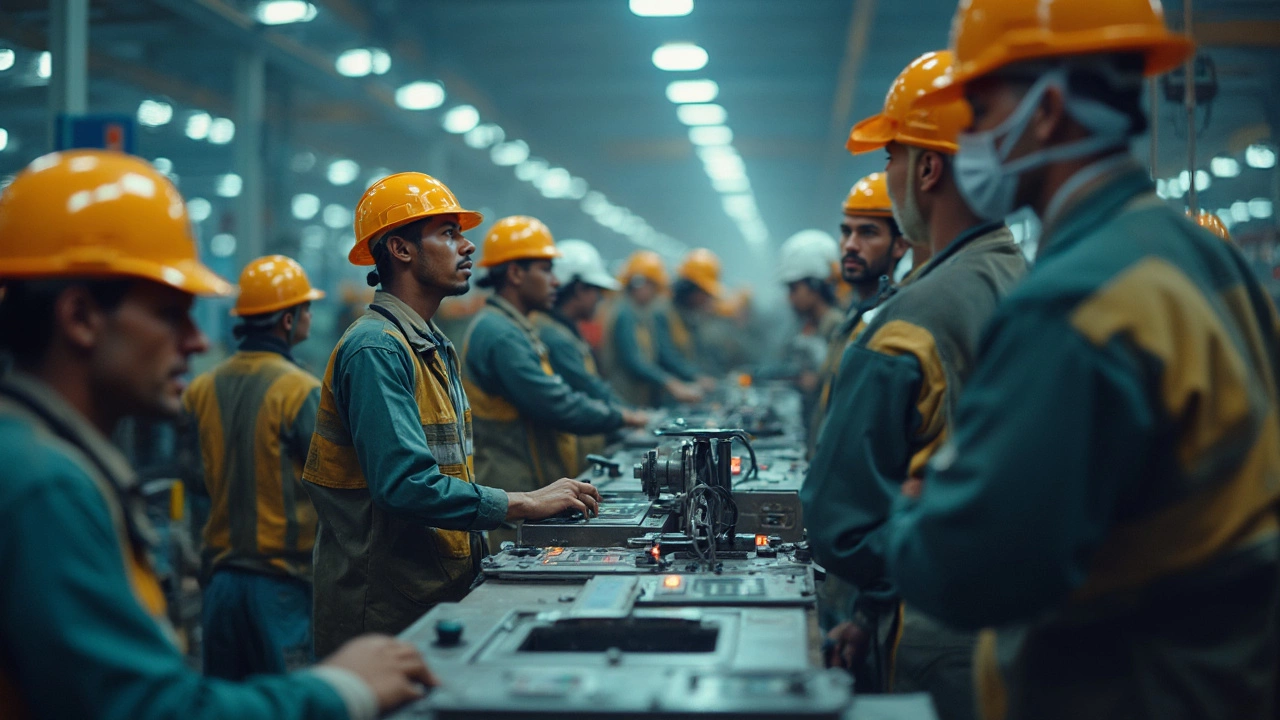Chasing a bigger paycheck on the factory floor? Small scale manufacturing has plenty of solid jobs, but not all of them treat your wallet the same. You might be surprised which ones top the list when it comes to bringing home the most cash.
It's not just about how many hours you put in. The type of work—and the skills you show up with—can mean the difference between scraping by and actually getting ahead. If you've wondered whether machine operators or quality inspectors do better, or if picking up a new skill could bump your pay, you're in the right spot.
This isn't about giant car factories or billion-dollar brands. We're talking about those smaller shops—places making custom metal parts, food products, or gadgets. The good news? Your training, grit, and willingness to learn usually matter more than fancy degrees.
Ready to see which factory roles actually pay the most, why the numbers look that way, and a few moves you can make to grab a bigger slice? Let’s get into the real nuts and bolts.
- The Highest Paying Factory Jobs on a Small Scale
- Which Skills Score Bigger Paychecks?
- Industry Trends That Pump Up Wages
- Tips to Boost Your Earnings in Manufacturing
- Real-World Paychecks: What Workers Actually Make
The Highest Paying Factory Jobs on a Small Scale
If you want to make real money in small scale manufacturing, where should you look first? Not every job in a small factory pays the same. Some roles have more stress and responsibility, but definitely fatter paychecks than the rest. Let’s break it down so you know where to aim if you’re after top dollar.
A few jobs consistently come up as the best paying gigs in these smaller settings:
- Skilled Machine Operators – Think CNC machinists, injection molding techs, or laser cutting pros. Companies will pay more for folks who keep expensive machines running smoothly. In 2024, experienced operators quickly hit $26–$32 per hour, especially if you can set up and troubleshoot.
- Quality Control Inspectors – This is the team making sure nothing slips through. If you can spot defects and handle inspection tools, you’ll find QC roles paying $22–$29 per hour, with food and medical factories paying at the higher end.
- Maintenance Technicians – Without these guys, whole shops shut down when equipment fails. Multiskilled techs with electrical and mechanical chops often pull in $28–$36 per hour—sometimes more if you’re on call for breakdowns.
- Production Supervisors and Team Leads – If you can manage people and processes, these roles pay well. Expect $50,000–$72,000 per year in many regions, with bonuses in busy seasons. You need both people skills and production know-how for this one.
- Specialty Fabricators or Welders – Shops making custom parts (think aerospace bits or stainless tanks) can’t just hire anyone. Certified welders or fabricators regularly get $29–$39 an hour, especially if you know TIG or robotic welding.
Here’s a quick look at what folks are actually making in 2024, pulled from recent job boards and manufacturing surveys:
| Job Title | Typical Pay (Hourly) | Special Notes |
|---|---|---|
| Skilled Machine Operator | $26–$32 | Setup/troubleshooting skills boost pay |
| Quality Control Inspector | $22–$29 | Regulated industries pay more |
| Maintenance Technician | $28–$36 | Multiple disciplines = higher wages |
| Production Supervisor | $24–$35+ (or $50K–$72K/year) | Experience and leadership matter |
| Specialty Welder/Fabricator | $29–$39 | Certifications required |
The bottom line? If you’re after the highest paying factory jobs in small shops, it pays to build up your technical chops and target jobs that require more than just basic training. Specialized skills, certifications, and a bit of hustle go a long way toward getting the bigger paychecks in manufacturing.
Industry Trends That Pump Up Wages
If you’re hoping to earn more in small scale manufacturing, the big picture matters almost as much as your daily grind. Some clear industry trends are changing what factories will pay, and the smartest workers keep an eye on what’s hot. Here’s what’s going on right now that's pushing paychecks up.
- Automation and Tech Skills: Factories are investing in machines that do more than just repeat motions—think robots and high-end 3D printers. People who can program, maintain, or fix these machines can command a higher wage. If you’re good with tech, you’re worth more on a modern shop floor.
- Shortage of Skilled Labor: Fewer young people are heading into factory work, so shops are willing to offer more money to attract and keep hands-on talent. Skilled machine operators, CNC programmers, and maintenance techs are especially in demand.
- Specialty Production: Factories that focus on niche stuff—like custom medical devices, food processing, or high-precision auto parts—usually pay more. Their products are complex, and mistakes are expensive.
- Supply Chain Shifts: With more companies looking to make parts close to home and avoid shipping headaches, small local factories are getting busier. This drives up competition for workers and can lift pay rates.
- Safety and Health Rules: Since COVID-19, safer factories are the norm. Companies paying for certification or extra safety skills tend to pay more, especially in food and chemical production.
Take a look at real hourly wage averages from recent years for some of the most in-demand roles in small scale manufacturing:
| Job Title | Average Hourly Wage (USD) |
|---|---|
| Skilled Machine Operator | $22-$30 |
| CNC Programmer | $27-$38 |
| Quality Control Inspector | $18-$27 |
| Maintenance Technician | $25-$36 |
| Assembly Line Lead | $19-$28 |
Notice something? Tech-heavy jobs and roles where mistakes are costly grab the highest rates. If you want to move up in factory pay, training in automation, quality control, or maintenance pays off quickly.
It’s not luck—it’s about knowing where manufacturing is headed. The best paying factory jobs in 2025 aren’t just about showing up: they’re about staying sharp and saying yes to tech and specialty training whenever you get the chance.

Tips to Boost Your Earnings in Manufacturing
If you're eager to see bigger numbers on your paycheck, you’ve got options. Small steps, the right timing, and a bit of hustle go a long way. Here’s what works in real life on the factory floor:
- Factory pay jumps when you train up—skills like CNC machine operation, welding, or electronics repair almost always unlock higher hourly rates. Don’t just stick to one job if you can learn another.
- Certifications pack a punch. Getting certified in forklift driving, quality control, or Lean manufacturing? These can bump your hourly rate by 10 to 20 percent in some shops. They're proof that you know your stuff.
- Night shifts or overtime usually pay extra. Some factories shell out 25% more per hour for folks willing to work odd hours or weekends. If you can swing it, that adds up fast.
- Stick around, but not forever. Loyalty helps—you get dependable raises and first dibs on better jobs. But once you hit a ceiling, don’t be afraid to move shops for a better offer. New hires sometimes get paid more than old hands who never ask for a raise.
- Don’t be shy about asking for a review. Bring up specific jobs you’ve learned, mistakes you’ve caught, or ways you’ve saved the shop money. Bosses notice workers who add value, not just time.
Check out how some specialized skills compare—this table sums up average pay bumps by certification or extra responsibility in small scale manufacturing as of late 2024:
| Skill or Certification | Average Hourly Pay Increase (USD) |
|---|---|
| Certified CNC Operator | $3.00 |
| Forklift Certification | $1.25 |
| Welding Certification | $2.75 |
| Quality Control Training | $2.00 |
| Night Shift Premium | $2.50 |
One more tip: stay in the loop. Tech’s moving quick—even small factories are adding robots or 3D printers. If you can handle new gear, you’re instantly worth more. Keep your eyes open for training sessions, and take advantage of anything your boss offers for free.
Real-World Paychecks: What Workers Actually Make
If you're eyeing the highest paying factory jobs in small scale manufacturing, let's get down to brass tacks—actual numbers. No wild guesses here. We're talking factory pay based on what's happening across the U.S. as of 2025.
Small shops don’t splash CEO-level salaries, but some roles stand out. Operators running CNC machines or skilled welders pocket way more than entry-level assemblers. Tech skills and the ability to troubleshoot keep you steps ahead in both pay and job security.
| Factory Job | Hourly Pay (Median) | Annual Pay (Approx.) |
|---|---|---|
| CNC Machine Operator | $23.00 | $47,800 |
| Industrial Electrician | $28.50 | $59,300 |
| Welder/Fabricator | $21.75 | $45,200 |
| Quality Control Inspector | $19.50 | $40,500 |
| Assembly Line Worker | $17.00 | $35,400 |
Location also messes with your take-home. Spots like Minnesota and Ohio tend to offer 10-20% more than smaller towns in the South, especially for welders and industrial electricians. And some family-run specialty shops toss in bonuses or profit sharing—another perk you won’t see on every job board.
Keep in mind, these numbers are for folks with at least a year or two of experience. Total beginners might see slightly lower pay, but it climbs fast once you get your hands dirty and prove your skills.
- If you want to get paid more, learn to run more than one type of machine.
- Show up for extra shifts—overtime rates (usually time-and-a-half) can seriously fatten your check.
- Ask about training for new tech hands-on; the more you know, the more valuable you are.
The factory pay you end up with depends a ton on what you do and how willing you are to level up. Nobody’s getting rich day one, but with the right moves, you’re not stuck at the bottom either.











Write a comment